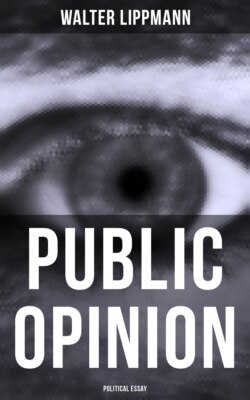Читать книгу Public Opinion: Political Essay - Walter Lippmann - Страница 7
На сайте Литреса книга снята с продажи.
2
ОглавлениеGreat men, even during their lifetime, are usually known to the public only through a fictitious personality. Hence the modicum of truth in the old saying that no man is a hero to his valet. There is only a modicum of truth, for the valet, and the private secretary, are often immersed in the fiction themselves. Royal personages are, of course, constructed personalities. Whether they themselves believe in their public character, or whether they merely permit the chamberlain to stage-manage it, there are at least two distinct selves, the public and regal self, the private and human. The biographies of great people fall more or less readily into the histories of these two selves. The official biographer reproduces the public life, the revealing memoir the other. The Charnwood Lincoln, for example, is a noble portrait, not of an actual human being, but of an epic figure, replete with significance, who moves on much the same level of reality as Aeneas or St. George. Oliver's Hamilton is a majestic abstraction, the sculpture of an idea, "an essay" as Mr. Oliver himself calls it, "on American union." It is a formal monument to the state-craft of federalism, hardly the biography of a person. Sometimes people create their own facade when they think they are revealing the interior scene. The Repington diaries and Margot Asquith's are a species of self-portraiture in which the intimate detail is most revealing as an index of how the authors like to think about themselves.
But the most interesting kind of portraiture is that which arises spontaneously in people's minds. When Victoria came to the throne, says Mr. Strachey,4 "among the outside public there was a great wave of enthusiasm. Sentiment and romance were coming into fashion; and the spectacle of the little girl-queen, innocent, modest, with fair hair and pink cheeks, driving through her capital, filled the hearts of the beholders with raptures of affectionate loyalty. What, above all, struck everybody with overwhelming force was the contrast between Queen Victoria and her uncles. The nasty old men, debauched and selfish, pigheaded and ridiculous, with their perpetual burden of debts, confusions, and disreputabilities—they had vanished like the snows of winter and here at last, crowned and radiant, was the spring."
M. Jean de Pierrefeu5 saw hero-worship at first hand, for he was an officer on Joffre's staff at the moment of that soldier's greatest fame:
"For two years, the entire world paid an almost divine homage to the victor of the Marne. The baggage-master literally bent under the weight of the boxes, of the packages and letters which unknown people sent him with a frantic testimonial of their admiration. I think that outside of General Joffre, no commander in the war has been able to realize a comparable idea of what glory is. They sent him boxes of candy from all the great confectioners of the world, boxes of champagne, fine wines of every vintage, fruits, game, ornaments and utensils, clothes, smoking materials, inkstands, paperweights. Every territory sent its specialty. The painter sent his picture, the sculptor his statuette, the dear old lady a comforter or socks, the shepherd in his hut carved a pipe for his sake. All the manufacturers of the world who were hostile to Germany shipped their products, Havana its cigars, Portugal its port wine. I have known a hairdresser who had nothing better to do than to make a portrait of the General out of hair belonging to persons who were dear to him; a professional penman had the same idea, but the features were composed of thousands of little phrases in tiny characters which sang the praise of the General. As to letters, he had them in all scripts, from all countries, written in every dialect, affectionate letters, grateful, overflowing with love, filled with adoration. They called him Savior of the World, Father of his Country, Agent of God, Benefactor of Humanity, etc…. And not only Frenchmen, but Americans, Argentinians, Australians, etc. etc…. Thousands of little children, without their parents' knowledge, took pen in hand and wrote to tell him their love: most of them called him Our Father. And there was poignancy about their effusions, their adoration, these sighs of deliverance that escaped from thousands of hearts at the defeat of barbarism. To all these naif little souls, Joffre seemed like St. George crushing the dragon. Certainly he incarnated for the conscience of mankind the victory of good over evil, of light over darkness.
Lunatics, simpletons, the half-crazy and the crazy turned their darkened brains toward him as toward reason itself. I have read the letter of a person living in Sydney, who begged the General to save him from his enemies; another, a New Zealander, requested him to send some soldiers to the house of a gentleman who owed him ten pounds and would not pay.
Finally, some hundreds of young girls, overcoming the timidity of their sex, asked for engagements, their families not to know about it; others wished only to serve him."
This ideal Joffre was compounded out of the victory won by him, his staff and his troops, the despair of the war, the personal sorrows, and the hope of future victory. But beside hero-worship there is the exorcism of devils. By the same mechanism through which heroes are incarnated, devils are made. If everything good was to come from Joffre, Foch, Wilson, or Roosevelt, everything evil originated in the Kaiser Wilhelm, Lenin and Trotsky. They were as omnipotent for evil as the heroes were omnipotent for good. To many simple and frightened minds there was no political reverse, no strike, no obstruction, no mysterious death or mysterious conflagration anywhere in the world of which the causes did not wind back to these personal sources of evil.
